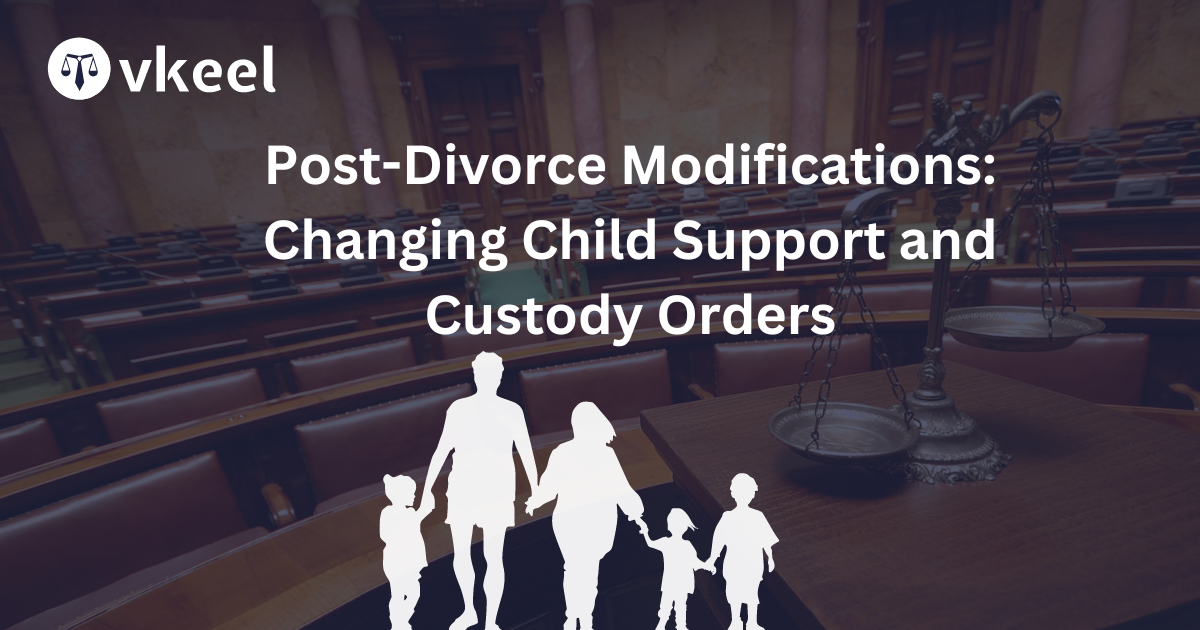Post-Divorce Modifications: Changing Child Support and Custody Orders
By Himanshu Kumar
Table of Contents
Introduction
Divorce marks the end of a marital relationship but often signals the beginning of ongoing legal responsibilities and adjustments, particularly when children are involved. As circumstances evolve, post-divorce modifications to child support and custody orders become necessary to reflect the current realities of both parents and children.
The primary concern in post-divorce modifications is ensuring the welfare and best interests of the child. As children grow and their needs evolve, it is crucial that custody and child support arrangements are adapted to reflect these changes. The court’s primary focus is on the child’s well-being, ensuring that they have adequate financial support, a stable living environment, and access to education and healthcare. Any modification to the original divorce decree must prioritize these factors, considering the child’s emotional, physical, and psychological development.
Another significant concern is maintaining fairness and equity between the divorced parents. Changes in financial circumstances, such as job loss or increased income, must be fairly addressed to ensure that the support provided is both adequate and reasonable. Additionally, relocation or changes in the personal circumstances of either parent can impact visitation rights and custody arrangements, necessitating modifications. The legal process must balance these competing interests, ensuring that both parents’ rights and responsibilities are fairly considered while prioritizing the child’s needs. Effective communication, mediation, and judicial discretion are essential in navigating these modifications to achieve outcomes that support the child’s best interests and equitable parental involvement.
Legal Framework for Post-Divorce Modifications
In India, post-divorce modifications are governed by various family laws, depending on the religious community to which the parties belong. The key statutes include:
- Hindu Marriage Act, 1955: Governs divorce and related issues for Hindus, Buddhists, Jains, and Sikhs.
- Special Marriage Act, 1954: Applicable to inter-religious marriages and those who choose civil marriage.
- Indian Divorce Act, 1869: Pertains to divorce among Christians.
- Muslim Personal Law (Shariat) Application Act, 1937: Governs divorce and related issues for Muslims.
Each of these laws contains provisions for the maintenance and welfare of children, with the courts empowered to modify orders as circumstances change.
Grounds for Modifying Child Support and Custody Orders
Post-divorce modifications are typically sought when there is a significant change in circumstances. Common grounds include:
- Change in Income: A substantial increase or decrease in the income of either parent can necessitate a modification of child support orders.
- Change in Needs of the Child: As children grow, their needs evolve. Education, healthcare, and extracurricular activities can require adjustments to support payments.
- Relocation: If one parent needs to relocate, it can impact custody and visitation arrangements.
- Parental Behavior: Changes in the behavior or lifestyle of a parent, such as remarriage, substance abuse, or criminal activity, can lead to modifications in custody orders.
- Child’s Preference: As children mature, their preferences regarding living arrangements may be taken into consideration by the court.
Legal Provisions and Case Laws
- Section 26 of the Hindu Marriage Act, 1955: This section empowers the court to pass orders regarding the custody, maintenance, and education of minor children consistently with their wishes, where possible. The court can modify these orders as deemed necessary.
- Section 38 of the Special Marriage Act, 1954: Similar to the Hindu Marriage Act, this section allows the court to issue orders concerning the custody and maintenance of children, with provisions for modification.
Landmark Judgments
- Gaurav Nagpal v. Sumedha Nagpal (2009): In this case, the Supreme Court of India emphasized the welfare of the child as the paramount consideration in custody matters. The court ruled that custody arrangements must serve the best interests of the child, which could warrant modifications if circumstances change.
- Dhanwanti Joshi v. Madhav Unde (1998): The Supreme Court reiterated that while the custodial parent’s right to relocate is recognized, it should not adversely affect the child’s welfare. This judgment has been pivotal in cases where relocation necessitates modifications in custody and visitation arrangements.
- Roxann Sharma v. Arun Sharma (2015): In this case, the Supreme Court held that custody of children under five years should generally be with the mother unless there are compelling reasons to decide otherwise. This judgment highlights the dynamic nature of custody decisions and the need for modifications as children grow older.
Amendments and Evolving Structure
In recent years, there have been several amendments and proposals aimed at addressing the complexities of post-divorce modifications:
- The Family Courts (Amendment) Bill, 2020: This proposed amendment seeks to streamline family court procedures, including those related to post-divorce modifications. It emphasizes mediation and conciliation as means to resolve disputes, including modifications to child support and custody orders.
- The Maintenance and Welfare of Parents and Senior Citizens (Amendment) Bill, 2019: While primarily focused on senior citizens, this bill includes provisions that could impact post-divorce maintenance orders, emphasizing the importance of timely and adequate financial support.
Process of Seeking Modifications
The process of seeking modifications typically involves the following steps:
- Filing a Petition: The concerned party must file a petition in the appropriate family court detailing the changes in circumstances and the need for modification.
- Evidence Submission: Both parties may need to submit evidence supporting their claims. This can include financial statements, school reports, medical records, and other relevant documents.
- Court Hearing: The court will conduct a hearing where both parties can present their arguments. The judge may also interview the child, if appropriate.
- Mediation and Counseling: Family courts often encourage mediation and counseling to reach an amicable resolution without prolonged litigation.
- Court Order: Based on the evidence and arguments, the court will issue a modified order that reflects the current needs and circumstances.
Role of Mediation and Counseling
Mediation and conciliation play a crucial role in post-divorce modifications by providing a collaborative and non-adversarial approach to resolving disputes. These processes allow divorced parents to communicate openly and work together to find mutually agreeable solutions regarding child support, custody, and visitation adjustments. By focusing on cooperation and understanding, mediation and conciliation help reduce the emotional and financial stress often associated with litigation. This approach is particularly beneficial in ensuring that the needs and best interests of the child are prioritized, as parents are more likely to reach solutions that are tailored to their unique family dynamics.
Furthermore, mediation and conciliation empower parents to take control of the decision-making process, fostering a sense of ownership and commitment to the agreed-upon modifications. These methods also provide a more flexible and quicker resolution compared to the often lengthy and rigid court proceedings. Courts and family law practitioners increasingly recognize the value of mediation and conciliation in post-divorce modifications, encouraging their use to achieve amicable outcomes that support the long-term well-being of the child and maintain a cooperative co-parenting relationship.
Challenges and Considerations
- Enforcement of Orders: Ensuring compliance with modified orders can be challenging. Courts may need to take enforcement actions against non-compliant parents.
- Balancing Interests: Courts must balance the interests of both parents while prioritizing the child’s welfare. This often requires careful consideration of various factors, including financial stability, emotional bonds, and living conditions.
- Judicial Discretion: Judges have considerable discretion in determining modifications, which can lead to variability in outcomes. Consistency in applying legal principles is crucial to ensure fairness.
- Cultural Factors: In India, cultural and societal norms influence family dynamics. Courts often navigate these complexities while making decisions in the best interests of the child.
Conclusion
Post-divorce modifications to child support and custody orders are essential to accommodate the evolving needs of children and the changing circumstances of parents. The legal framework in India provides mechanisms for such modifications, with courts empowered to ensure that the best interests of the child remain paramount. Landmark judgments and recent amendments highlight the dynamic nature of family law, reflecting the necessity for ongoing adjustments. As societal norms and family structures continue to evolve, the legal system must adapt to provide fair and effective solutions for post-divorce modifications.
The importance of mediation and counseling in resolving disputes cannot be overstated, offering a path to amicable resolutions and reducing the adversarial nature of litigation. Ensuring the welfare of children post-divorce requires a holistic approach, considering emotional, financial, and developmental aspects. By prioritizing the best interests of the child and ensuring fair treatment of both parents, the legal system plays a pivotal role in navigating the complexities of post-divorce life.
Disclaimer:
The information provided in the article is for general informational purposes only, and is not intended to constitute legal advice or to be relied upon as a substitute for legal advice. Furthermore, any information contained in the article is not guaranteed to be current, complete or accurate. If you require legal advice or representation, you should contact an attorney or law firm directly. We are not responsible for any damages resulting from any reliance on the content of this website.










